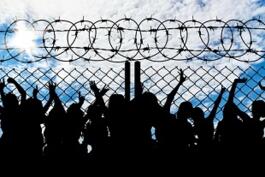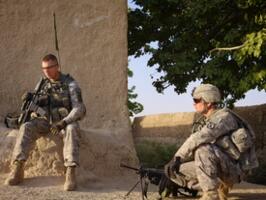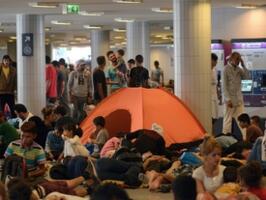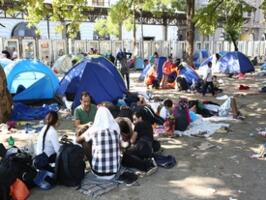49% Want to Declare War on ISIS
Despite the recent horrific terrorist attacks in Paris, voters here aren’t ready to take the lead in the fight against the radical Islamic State group (ISIS), but they’re close to a formal declaration of war.

Despite the recent horrific terrorist attacks in Paris, voters here aren’t ready to take the lead in the fight against the radical Islamic State group (ISIS), but they’re close to a formal declaration of war.

Americans aren’t happy with President Obama’s response to the recent massacres in Paris by radical Islamic terrorists but feel even more strongly that prominent Muslims need to speak out against these atrocities.

President Obama, Hillary Clinton and other senior Democrats refuse to say America is at war with “radical Islamic terrorism” for fear of insulting all Muslims, but voters beg to disagree.

President Obama says the Syrian refugees he hopes to move here are no more dangerous than tourists. The governors of more than two dozen states, citing the links between those refugees and the weekend massacres in Paris, aren’t convinced and have asked the president not to settle them in their states.

Active duty military and veterans tend to favor increased U.S. combat involvement against the radical Islamic group ISIS and aren't as concerned as the American public in general about the willingness of political leaders to put soldiers' lives on the line.

Voter confidence in the Obama administration’s fight against the radical Islamic group ISIS is down despite the president’s decision to send a small number of troops to Syria, perhaps because voters strongly suspect that more will soon be on the way.

U.S. Secretary of State John Kerry met with Israeli Prime Minister Benjamin Netanyahu Thursday and is set to meet with Palestinian Authority President Mahmoud Abbas about the recent escalation of violence in Jerusalem between Israelis and Palestinians, but most voters don’t want to see much more U.S. involvement in the situation.

Voters may have mixed opinions about the number of refugees the government should allow to resettle in the United States, but most are concerned that taking in a large number of Syrians poses a security threat.

Some lawmakers are proposing that the U.S. military establish a no-fly zone in Syria to protect civilians in that civil war-torn country, and voters here tend to think that’s a good idea. But they also worry that it may lead to a U.S.-Russian military conflict.

U.S. voters want to put the breaks on the Obama administration’s plans to bring tens of thousands more refugees into this country over the next two years, many from the Middle East, and strongly believe Congress should have a say in the matter.

Increased media attention on the Syrian migrant crisis has undoubtedly raised new concerns about the global impact of that country’s ongoing civil war, and U.S. voters are listening. But does that mean the United States should take a more active role in stemming the violence?

The Obama administration announced this week plans to increase the total number of worldwide refugees accepted into the United States to 100,000 by 2017 in response to the ongoing migrant crisis from parts of the Middle East into Europe. Few U.S. voters agree with this decision, perhaps in part because a sizable majority have national security concerns.

President Obama announced yesterday that the United States will take in up to 10,000 Middle Eastern migrants to help alleviate the illegal immigration crisis now besetting Europe. Americans aren't sure that's such a good idea.

An Egyptian court this week handed down the first guilty verdict and sentencing to ousted President Mohamed Morsi for his role in the arrest and torture of protesters in 2012. American opinions of Egypt’s relationship with the United States haven’t changed, but voters are slightly more confident about the future of Egypt’s democracy than they were just after the violence there reached its peak.
A new Rasmussen Reports national telephone survey finds that 34% of Likely U.S. Voters think Egypt is likely to become a free, democratic and peaceful nation over the next several years. That’s up slightly from 29% in December and in August of 2013, following widespread violence during the ouster of the Muslim Brotherhood president. In February 2011 just after the overthrow of longtime President Hosni Mubarak, 54% showed this level of optimism for the North African country.
Fifty-one percent (51%) now say it’s unlikely Egypt will become a free, democratic and peaceful nation anytime soon, down from 55% in the previous survey. These findings include six percent (6%) who say it’s Very Likely Egypt will reach this goal and nine percent (9%) who say that’s Not At All Likely. Fourteen percent (14%) are not sure. (To see survey question wording, click here.)
(Want a free daily e-mail update? If it's in the news, it's in our polls). Rasmussen Reports updates are also available on Twitter or Facebook.
The survey of 1,000 Likely Voters was conducted on April 21-22, 2015 by Rasmussen Reports. The margin of sampling error is +/- 3 percentage points with a 95% level of confidence. Field work for all Rasmussen Reports surveys is conducted by Pulse Opinion Research, LLC. See methodology.
Additional information from this survey and a full demographic breakdown are available to Platinum Members only.

As the violence in Yemen escalates, American voters continue to be skeptical about the political changes in the region brought about by the so-called “Arab Spring” and worry they have made the United States less safe. (To see survey question wording, click here.)
(Want a free daily e-mail update? If it's in the news, it's in our polls). Rasmussen Reports updates are also available on Twitter or Facebook.
The survey of 1,000 Likely Voters was conducted on April 1-2, 2015 by Rasmussen Reports. The margin of sampling error is +/- 3 percentage points with a 95% level of confidence. Field work for all Rasmussen Reports surveys is conducted by Pulse Opinion Research, LLC. See methodology.

Voters are a bit more open to the idea of Israeli Prime Minister Benjamin Netanyahu addressing Congress tomorrow about Iran despite strong protest from the White House, and most consider it important whether their congressional representative is attending.
(Want a free daily e-mail update? If it's in the news, it's in our polls). Rasmussen Reports updates are also available on Twitter or Facebook.
The survey of 800 Likely Voters was conducted on February 26-27, 2015 by Rasmussen Reports. The margin of sampling error is +/- 3.5 percentage points with a 95% level of confidence. Field work for all Rasmussen Reports surveys is conducted by Pulse Opinion Research, LLC. See methodology.

While American voters aren’t entirely convinced Israeli Prime Minister Benjamin Netanyahu should address Congress about Iran despite protest from the White House, a plurality also believes the relationship between the United States and Israel has gotten colder since President Obama took office.
A new Rasmussen Reports national telephone survey finds that 42% of Likely Voters think Netanyahu should accept Republican congressional leaders’ invitation to address Congress about Iran even if President Obama does not want him to come. Thirty-five percent (35%) disagree and don’t think the Israeli prime minister should address Congress. Twenty-three percent (23%) are undecided. (To see survey question wording, click here.)
(Want a free daily e-mail update? If it's in the news, it's in our polls). Rasmussen Reports updates are also available on Twitter or Facebook.
The survey of 800 Likely Voters was conducted on January 29-30, 2015 by Rasmussen Reports. The margin of sampling error is +/- 3.5 percentage points with a 95% level of confidence. Field work for all Rasmussen Reports surveys is conducted by Pulse Opinion Research, LLC. See methodology.

Few U.S. voters think Saudi Arabia will become a more liberated society following the passing of King Abdullah and the quick succession of his half-brother, King Salman. While fewer voters view the kingdom as an enemy of the United States these days, they criticize its handling of Islamic terrorism and think it gets away with too many human rights abuses.
A new Rasmussen Reports national telephone survey finds that just 22% of Likely U.S. Voters think it is at least somewhat likely that Saudi Arabia will become a freer and more democratic society over the next few years. Sixty-one percent (61%) see those changes as unlikely. This includes just two percent (2%) who think Saudi Arabia will be a more open society and 18% who think that’s Not At All Likely. A sizable 17% are not sure. (To see survey question wording, click here.)
(Want a free daily e-mail update? If it's in the news, it's in our polls). Rasmussen Reports updates are also available on Twitter or Facebook.
The survey of 800 Likely Voters was conducted on January 23-24, 2015 by Rasmussen Reports. The margin of sampling error is +/- 3.5 percentage points with a 95% level of confidence. Field work for all Rasmussen Reports surveys is conducted by Pulse Opinion Research, LLC. See methodology.

Americans strongly believe the Taliban, the Islamic fundamentalist group in Afghanistan who last week took credit for the murder of 130 school children, does not truly represent its faith.
Just 16% of Likely U.S. Voters think the Taliban represents true Islamic beliefs, according to a new Rasmussen Reports national telephone survey. Sixty-nine percent (69%) say the group which ruled its country for six years as the Islamic Emirate of Afghanistan does not represent the true beliefs of Islam. Another 16% are undecided. (To see survey question wording, click here.)
(Want a free daily e-mail update? If it's in the news, it's in our polls). Rasmussen Reports updates are also available on Twitter or Facebook.
The national survey of 1,000 Likely Voters was conducted on December 17-18, 2014 by Rasmussen Reports. The margin of sampling error is +/- 3 percentage points with a 95% level of confidence. Field work for all Rasmussen Reports surveys is conducted by Pulse Opinion Research, LLC. See methodology.

Voters are hesitant to join in the search for the Taliban killers who massacred 145 people, most of them children, in a school in Pakistan, but the incident has dramatically reduced support for U.S. negotiations with the radical Islamic group to end the war in Afghanistan.
Just 42% of Likely U.S. Voters think the United States should help Pakistan find the perpetrators of the school massacre and bring them to justice. The latest Rasmussen Reports national telephone survey finds that 32% are opposed to U.S. involvement in the matter, while another 27% are not sure.(To see survey question wording, click here.)
(Want a free daily e-mail update? If it's in the news, it's in our polls). Rasmussen Reports updates are also available on Twitter or Facebook.
The national survey of 1,000 Likely Voters was conducted on December 17-18, 2014 by Rasmussen Reports. The margin of sampling error is +/- 3 percentage points with a 95% level of confidence. Field work for all Rasmussen Reports surveys is conducted by Pulse Opinion Research, LLC. See methodology.